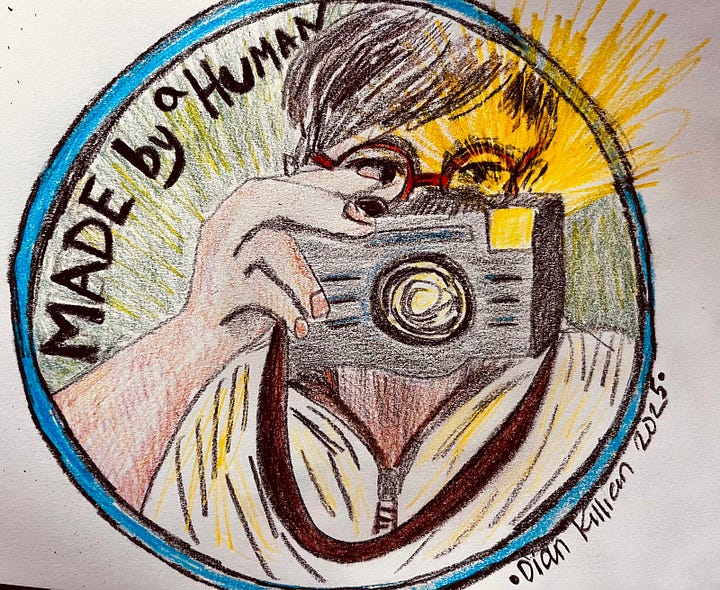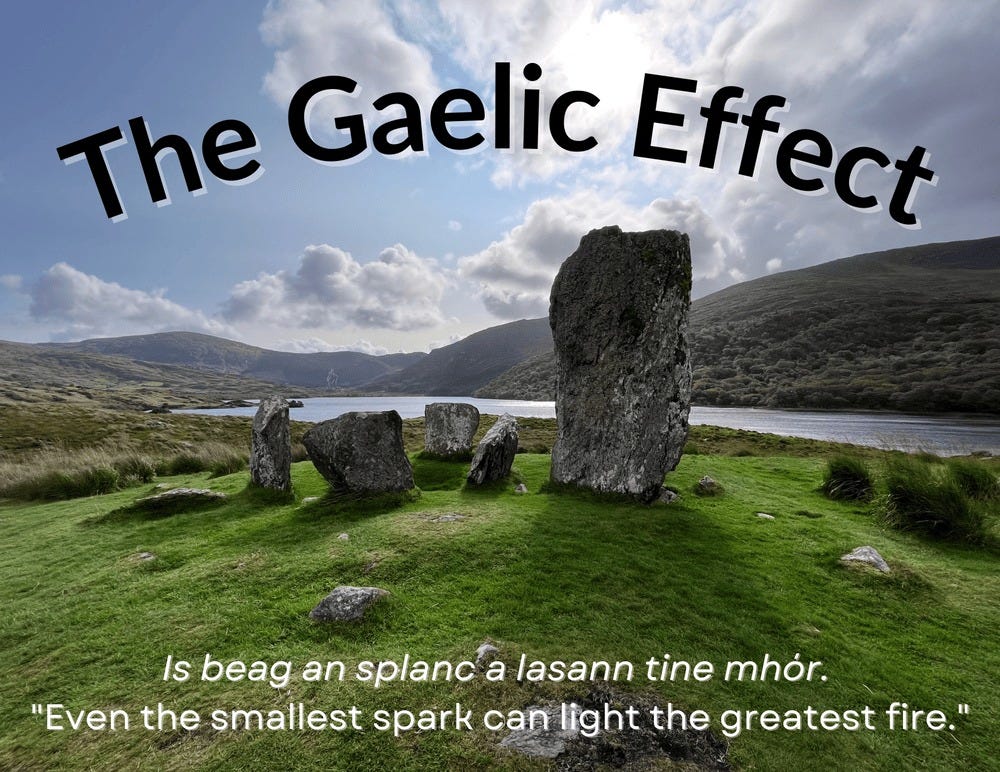'You write in order to change the world ... if you alter, even by a millimeter, the way people look at reality, then you can change it.” —James Baldwin
The Gaelic Effect inspires new possibilities for human beings by exploring indigenous culture through the Irish language. This exploration is in response to what I see happening in the world. Given this, I wish to share with you an article I consider a highly readable meta on what’s happening in the U.S. and the broader implications internationally: American Authoritarianism. The Gaelic Effect will continue to offer an alternative view —with inspiration and solace—for these liminal times.
Nóta (note): Read The Gaelic Effect in the Substack app for the best visual experience. And be sure to check out the hyperlinks: Irish words link to their pronunciation, key concepts go to more in-depth information, and key words after quotes go to citations. Happy delving!
Now…for this week’s edition of The Gaelic Effect:
A blessing in each breath
Many everyday expressions in Irish take the form of a blessing. In Debt or Abundance, I explored how “thank you” in Irish (unlike in English, where it’s more a score card for debt), literally means “may good/ness come to you.” When you say goodby in Irish, the full form, slán abhaile, is literally, “(may you) get home safe.” You can also just say, slán (akin to “bye”) or slán-slán (bye-bye) or other forms, such as slán agat (said by the person leaving) or slán leat (said in response) or slán go fóill (“by for now”). Slán literally means “sound, healthy, and safe.” So whenever you say slán, in whatever form, you are wishing health, soundness and safety—at, with, and yet (still) with you. (Slán by the way comes from the same root as sláinte —health—which is how you say “cheers” in Irish.) Saying slán is almost like a micro version of the Buddhist metta:
May "all beings" be happy, healthy and whole. May they have love, warmth and affection. May they be protected from harm, and free from fear. May they be alive, engaged and joyful…
…May they be safe, healthy and sound.
In English, we typically close a letter with “sincerely” or “yours truly;” this contractual, oath-like language reminds me of other expressions in English that seem about human connection but actually have to do with ownership, legality and hierarchy (see What’s Love Got to Do with It? and A World of Please and Thank You). In Irish, a common way to close a letter is, Beir bua agus beannacht: “Bring victory and blessings.” Or Slán agus beannacht (health and blessings to you) or Le gach deá ghuí or deá mhéin (“with every good wish” or “good luck”) or, the most formal, Le meas (“with respect”). No reference to debt, class, property or oaths here but a warm embrace of benevolence and goodwill.
An Invocation in each greeting
Even saying “hello” In Irish leads to an elaborate and expansive series of invocations. More of a prayer than a greeting, it’s interactive (reflecting the high level of relationality in Irish) and iterative, with blessings multiplying like bunny rabbits. The first person to speak says, Dia duit (“God to or for you”) or, if saying hello to more than one person at once, Dia daoibh (“God be with/for you both or all of you”). The second person replies: Dia is Muire duit /daoibh (“God and Mary to you/all of you”). If a third person joins the conversation, they say, Dia, Muire, agus Iósaef duit/daoibh (God, Mary, and Joseph to/with you/all). Jesus comes in next: Dia, Muire, Iósaef agus Íosa duit/daoibh (“God, Mary, Joseph and Jesus to you/all”). By just saying “hello,’ you invoke the entire holy family! I personally have yet to hear exchanges that get past God and Mary. Yet these iterations are possible; it’s possible to add even more saints. It’s become common now to hear Maidin mhaith, literally, “good morning.” But this is béarlachas —an Englishism. The original and truer-to -Irish language way of saying “good morning” is Dia duit ar maidin (God with/for you in the morning).
The most efficient and powerful hello-blessing of all is Dia anseo isteach. It is usually translated as, “God save all here” but literally means “God here inside” or (because isteach in Irish has a quality of movement to it) “God here (coming) in.” In The Secret of Roan Inish (one of my favorite films set in Ireland), you hear a direct translation of this phrase into Bearla (English) when Eamon arrives and says, “God bless all here” (Dia anseo isteach). Given the period this film is set in and that the characters are all recent refugees from a western island (the island of the seals), they would all have certainly been native Gaeilgeoirs (Irish speakers). Watch the excerpt where Eamon arrives here. (The full film is below.)
Hey You!
All these blessings are a far cry from the mundanity of English. “Hi” and “hello” (the common but poor translations of slán) are both highly transactional and (if you look at their etymology) simply a way to fetch someone or get their attention—like hailing a cab (but originally a ferry):
According to the Oxford English Dictionary, hello is an alteration of hallo, hollo,[1] which came from Old High German "halâ, holâ, emphatic imperative of halôn, holôn to fetch, used especially in hailing a ferryman".[5] It also connects the development of hello to the influence of an earlier form, holla, whose origin is in the French holà (roughly, 'whoa there!', from French là 'there').… (Wiki)
“Hello” then was a way to interrupt someone, demanding “that the listener come to a stop or cease what they were doing. It was also used to spur on hunting dogs.” (Dictionary.com)
Similar to spatial directions and telling time, where English has become increasingly detached from the natural world (see The Sun Stands Still), before “hi” and “hello” became popular it was common to greet people by referencing the time of day: “good morning,” “good afternoon,” “good evening.” Hello especially became prevalent after the invention of the telephone. When people “began connecting…in different time zones, greetings without time gained popularity. (Wiki) Regardless, “good” morning/afternoon/evening, while wishing someone well, is not a blessing. People often assume that “good” and “God” are related in English; they are not. Etymologically, they have no relation to each other. So even when English speakers say, “Good morning” (or evening) they are not invoking or inviting in a larger awareness or energy—something bigger and more expansive than themselves.
God is good, God is great, thank you for this food on my plate.
What if you’re not Christian?
For some people, the perceived religiosity of Irish is uncomfortable. My first year studying Irish in Ballyferriter, one of the Irish students asked our teacher, “How do you say hello in Irish if the other person isn’t Christian? “ I can see why this could be awkward. “God” is ecumenical at least. In French, you say adieu when saying good-by (for good—not like au revoir); in Spanish, adios. This means: (I commit you) to God. So Irish is not the only language with religious undertones. But invoking “Mary” is very specific to the Catholic faith. There are other ways to greet people in Irish. You can ask, Aon scéal? “Any story?” as in, “Any news? or “What’s happening?” You can also just ask, Conas tá tú? (“How are you?”). Haigh, an Irish spelling of “hi,” is more béarlachas I suspect but increasingly common. Like the original meaning of “hello” in English, it can also mean “hey.”
Bigger than you think
Yet “Dia” actually has preChristian roots:
What is important about the creation or origin myths of the Celts is the fact that, in the words of Caesar, 'the Celts claim all to be descended from Dis-Pater, declaring that this is the tradition preserved by the Druids'. […] In the Vedas, the sky god was called Dyaus and is recorded as the one who stretched, or reached, forth a long hand to protect his people. This is cognate with Deus in Latin, Dia in Irish and Devos in Slavonic. It means, significantly, 'bright one' and presumably denotes a sun deity. The Celts
I also appreciate how the divine feminine is brought in so quickly to an Irish “hello”— even if eventually outnumbered by male saints. It reminds me that one of Ireland’s patron saints is a woman, Brigit (who now has her own bank holiday) and who bridges the indigenous with the Christian. The whole island is named after a goddess, Ériu. Literally, this is Ériu’s land (Ireland).
When words were magic
These invocations in everyday speech bring us back to a bardic time when words were understood to have power. This tradition is larger than Celtic belief—how often in Genesis (the creation story according to the Abrahamic tradition) does something happen when God speaks it into being? (“And God said, Let there be light…And God said, Let the earth bring forth grass…”). In the Celtic tradition this weaves several threads: the power of the word (when words were magic); the awareness of liminality (reality existing simultaneously in more than one world at once—with the spiritual/unseen as “real” as the material and seen); and the mythic as geographic (where the materaial and spiritual merge). This takes us to the heart of Celtic spirituality: the spiritual (the mythic and epic) manifesting (made real) in the natural, physical world. Manchán Magan suggests that this is why trees were sacred for the Celts—they bridge the two worlds:
… trees … were able to unlock the energies or wisdom or life forces in this world, as well as the ethereal realms above us and the netherworld below — just as every tree interacts with the underland, the surface land and the sky.—Listen to the Land Speak
Dia anseo isteach. God—the sacred, the uncontainable, the epic—here, inside, with each of us, in the earth and sky, in each moment. As the Quakers say: that of God in everyone. The indigenous Celts say: God everywhere—in everything.
When you bring “God” (including its feminine aspect) into each greeting, you are naming this reality with each person you meet. This generative way of saying “hello” —with more saints increasingly added—speaks to abundance and magic, like the ever-expanding cloak of St. Brigit. It is inviting us into what Jason Kirkey refers to in The Salmon in the Spring, The Ecology of Celtic Spirituality as “cosmological belonging.” For a highly relational language and culture, it is the ultimate level of relationality.
So remember: we are more than just what we see of ourselves. Each time you say “hello” to someone, remember this beautiful fact.
Sending you draíocht (magic) from Dublin, and looking for the God in you,
Dian
You can also support The Gaelic Effect and its mission by making a one-time donation by clicking anseo (here).










Excellent article. Thank you for sharing!
❤️ “blessings multiplying like bunny rabbits”
❤️ the video clip is edited perfectly to set up the mystery and magic in the movie, to call out/honor the history (combined with you calling them refugees), to stir the longing that might be hiding in each heart to know itself or maybe even a person on the cusp of a soul retrieval (like the little girl discovering something of herself “out there”) AND to illustrate the teaching point you were emphasizing
😂 “(who now has her own bank holiday)”
🙌 “cosmic belonging”